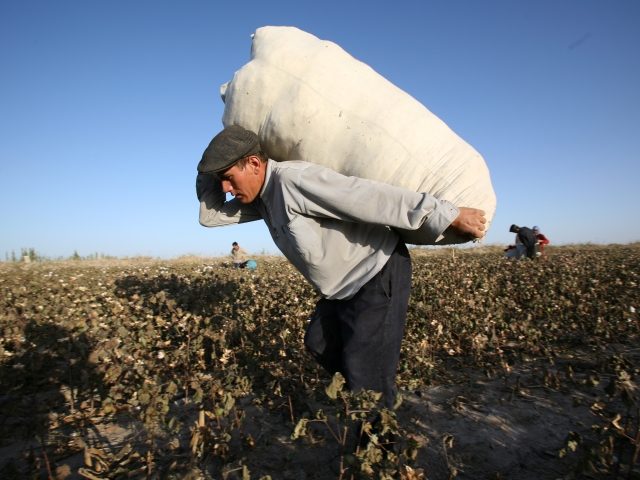China’s Global Times propaganda newspaper admitted this week, citing interviews with business owners and administrators, that the Uyghur Forced Labor Prevention Act has “dealt a big blow” to Chinese businesses in the occupied East Turkistan region where China is committing genocide against Uyghurs and other Turkic people.
The Uyghur Forced Labor Prevention Act (UFLPA), implemented this summer, is an American law that bans imports from East Turkistan, which China calls “Xinjiang,” unless the importer can prove that slavery is not present anywhere in the supply chain of that import. The law presumes that anything produced or manufactured in the region is tainted by slave labor, an assumption backed by extensive evidence that the Communist Party has used the Uyghur genocide to funnel untold numbers of concentration camp prisoners into forced labor in factories and farms across the country.
China is currently engaging in a genocide against Uyghurs, Kazakhs, Kyrgyz people, and others in East Turkistan fueled by the construction of upwards of 1,000 concentration camps for as many as 3 million people, where survivors say they were subjected to communist indoctrination, torture, gang rape, and slavery, among other crimes. Outside of the camps, the Communist Party has implemented a mass sterilization policy to ensure the diminution of the non-Han population and is believed to be selling Uyghurs as slaves to cotton farms and supplier factories nationwide.
While Chinese propagandists first mocked the UFLPA as doing little to stifle demand for East Turkistan products, the Global Times has more recently admitted that the law has apparently deterred not just American companies from importing the items but businesses around the world who anticipate that other free nations may soon pass their own restrictions on East Turkistan imports.
Speaking to the state-run Global Times in an article published Wednesday, the head of the China National Color Cotton Corp Liu Haifeng said that the law “has dealt a big blow to Xinjiang cotton.” About 90 percent of China’s cotton, and 20 percent of the world’s, originates in East Turkistan. Liu used the semi-official Chinese Communist Party nickname for the UFLPA, the “evil bill.”
Liu’s company had not, he said, begun importing products to the United States but had intended to do so before the anti-slavery law passed.
“Cotton futures have suffered a plunge accordingly, weighing on the sector at large, Liu said, and although Liu’s company focuses on color cotton, it cannot be entirely insulated from the industry-wide impact,” according to the Global Times.
The state-run newspaper reported that many companies in East Turkistan recently participated in an ongoing product expo on the other side of the country, in tropical Hainan, and are “actively in pursuit of a strong presence in the higher-end domestic consumer market.”
“Farm produce, food, jewelry and jade, and garments and textiles, among other Xinjiang-produced items, were on display,” the state publication listed, later adding to the list “fruit juice, dates, camel milk powder and other premium items.” Many of these products were not in high demand in the United States prior to the passage of the law, however, with the major exception of cotton products.
The collapse of the slavery-driven Chinese government industry in East Turkistan is also leading pro-regime companies to consider doing more business in Laos and Vietnam, the Times reported, which may benefit greatly from both the UFLPA and general interest by global companies in moving supply chains out of China. That plan may not be successful, the newspaper claimed, due to “the lack of sales networks in overseas markets,” which “put[s] its foreign sales under high-cost pressure.”
The concern the state media has expressed this week is the latest in a series of signs out of Beijing that the UFLPA has significantly damaged Chinese industry, despite targeting only one of China’s provinces (a 2020 study by the Australian Strategic Policy Institute found that China buses Uyghur slaves to factories outside of East Turkistan, supplying dozens of international companies). On June 21, the day the law went into effect, the Global Times published an article lamenting that American exporters and others around the world had already begun canceling orders from East Turkistan en masse, preparing for the implementation of the law.
Less than a month later, the South China Morning Post reported that China’s National Cotton Reserves Corporation (CNCRC), a government entity, had prepared to purchase as much as 500,000 tons of cotton from East Turkistan, easing the dramatic losses producers in the region were facing. The law, the Hong Kong newspaper reported, had “resulted in a massive unsold inventory: 3.3 million tonnes of cotton [that] were taking up inventory space at Xinjiang cotton mills by the end of May, which was over a million tonnes higher than it usually was that time of the year.”

COMMENTS
Please let us know if you're having issues with commenting.